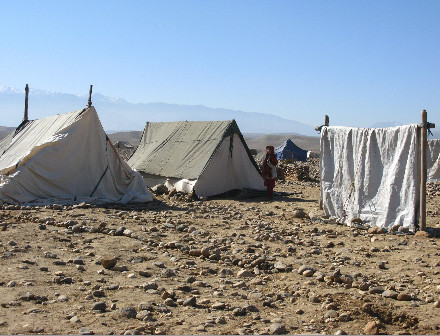Dozens of families who lost their homes after earthquakes in the eastern Afghan province of Nangarhar in April 2009 have moved to an informal settlement for internally displaced persons (IDPs) and called for urgent assistance.

IDPs at the Chamtala settlement also complained about lack of access to drinking water, health services, education and jobs. Afghanistan is vulnerable to natural disasters such as floods, avalanches and earthquakes which affect some 400,000 people a year, according to OCHA. (Photo: Ayub Farhat/IRIN)
Two earthquakes measuring 5.5 and 5.1 on the Richter scale rocked Sherzad and Hesarak districts in Nangarhar Province on 16-17 April, killing 22 people, injuring 59 and destroying 290 houses; 300-600 livestock were also lost and 650 families made homeless, according to the UN Office for the Coordination of Humanitarian Affairs (OCHA).
“We lost everything in the quakes so we could not live in Sherzad without a house in the cold winter,” said an IDP, Jamaluddin.
“We left our village because of recurrent tremors in the region and also because we were unable to rebuild our damaged houses,” Haji Wahab Jan, a representative of the quake-affected IDPs from Sherzad, told IRIN. He said hundreds of families whose houses and properties were destroyed in the quakes had moved to the edge of Chamtala Desert, about 30km from the provincial capital, Jalalabad.
Abdul Rahman Shams, director of Nangarhar refugees’ department, confirmed that “some families from Sherzad District” had gone to Chamtala Desert.
Aid agencies responded quickly after the earthquakes with food and non-food aid in April and May, according to OCHA and government officials.
However, some of the affected said the aid was too little and only met their immediate food and shelter needs.
“We lived under tents for several months but no one showed up to help us rebuild our houses and get back to normal,” said Haji Khair Mohammad, an elder from Sherzad District.
Plea for help
IDPs at the Chamtala settlement also complained about lack of access to drinking water, health services, education and jobs.
They were also worried about the onset of winter. According to the Famine Early Warning System of the US Agency for International Development, Afghanistan is already experiencing sub-zero temperatures.
“We call on the government and aid organizations to hear our voice and help us quickly,” said Haji Ajmal, another IDP representative.
Government officials said an assessment team would visit Sherzad and Hesarak districts in the near future to gauge needs.
“The governor has decided to assist the most vulnerable families after assessments are completed,” said provincial spokesman Ahmad Zia Ahmadzai, adding that land plots would be distributed in Chamtala Desert for IDPs unable to return to their homes.
The desert is also home to hundreds of returnees from Pakistan who are either landless or unable to go home due to insecurity and other socio-economic problems. They have been living in mud huts or tents there for over a year.
Afghanistan is vulnerable to natural disasters such as floods, avalanches and earthquakes which affect some 400,000 people a year, according to OCHA.



